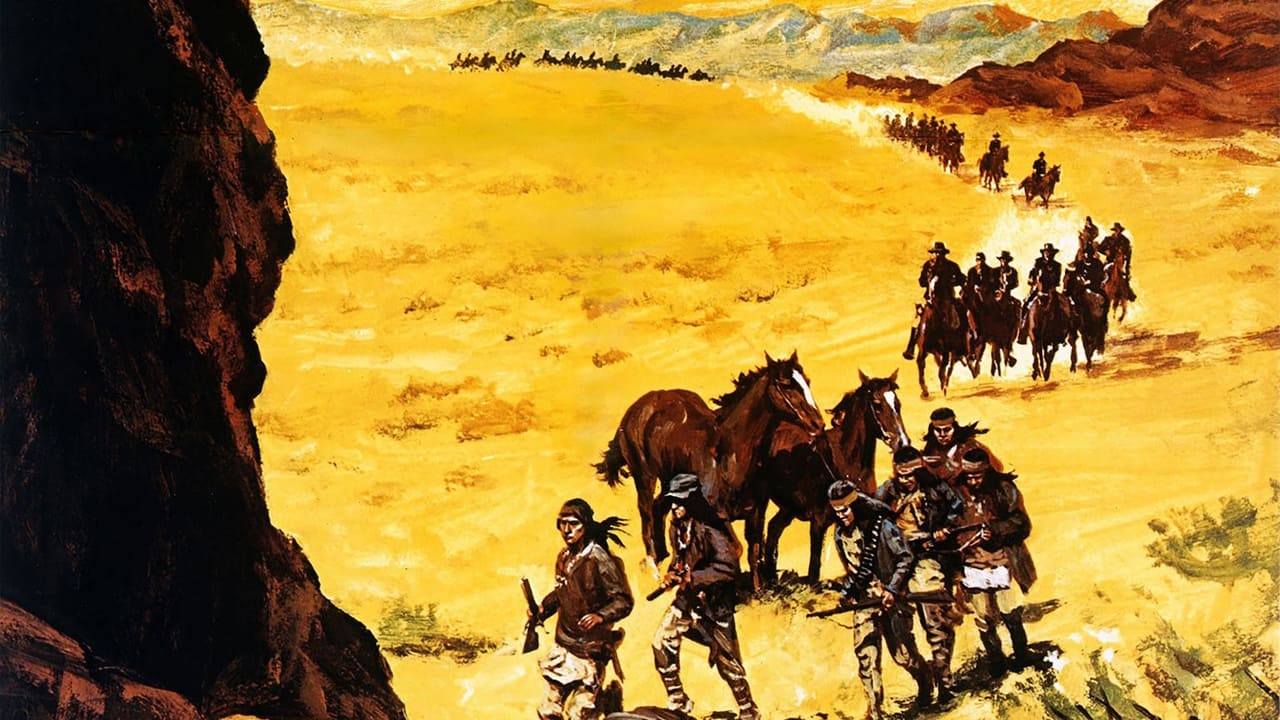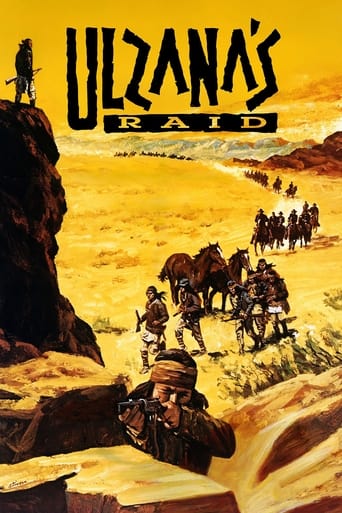

Director Robert Aldrich was always a movie maker with conscience, though conscience didn't always prevail. The Dirty Dozen, for example, fails to rise above commercial action-adventure, while Whatever Happened to Baby Jane stands as a nasty exercise in Gothic grotesqurie. Nonetheless, Ulzana's Raid remains a lasting tribute to a gutsy, principled filmmaker more uncompromised than most within the mushy ranks of Hollywood liberalism. In a nutshell: both cavalry and Indian emerge from Ulzana's Raid as authentic human beings, acting on motives consistent with their beliefs and disparate cultures. In the final analysis, neither side is shown as occupying the moral highground. Instead both are shown as capable of sometimes cruel sometimes noble acts, utilizing both uncommon resourcefulness and distinct codes of honor. Sort of like real people, which for the mythologized world of the Western, represents real departure. If the cavalry wins, it's not because of numbers or superior men at arms. It's because they've been able to bribe an Indian turncoat into acting as scout. This is not ignoble subterfuge. Instead it reflects the Darwinist world of one culture replacing another and doing whatever it takes to people the land with their own kind. Moral hindsight would--I believe--favor the Indian because of prior claim on the land, and that's what's subversive about a movie like this. By equating the two sides, the Indian stands as the white man's equal, thereby undercutting notions of cultural superiority. That's why Bruce Davison's callow lieutenant keeps insisting on Christian beliefs. He's not so much afraid of losing the battle or his own life as he is of losing notions of inherent superiority. It's also why Lancaster's wordless nod to the Apache scout before expiring is so meaningful. Despite appearances, the film is not an exercise in moral relativism. Instead, it's a very moral movie, requiring us to look deeply within ourselves, before labeling others as evil or barbaric. It's also why the Burt Lancaster character is so affecting. He understands this simple truth in a profound way. The parallels with international politics in the new millennium are too obvious to be overlooked, and the lessons remain as valid now as in 1973. This is a thinking person's Western, one of the very best, and deserves rediscovery on at least at a cult level.
... View More"Ulzana's Raid" went unnoticed when it was released in 1972 and I can understand why to a degree because it's not a rollicking, cartoony Western. It's a grim, adult-oriented Western that's realistic and thought-provoking, not to mention utterly brutal. I've come to appreciate it more as I get older.THE PLOT: A greenhorn Lieutenant, DeBuin (Bruce Davison), is assigned to a fort in Arizona and is put in charge of a company to stop the eponymous Apache chief (Joaquín Martínez) and his band who've jumped the reservation. A veteran sergeant (Richard Jaeckel), a weathered scout named McIntosh (Burt Lancaster) and his Apache partner, Ke-Ni-Tay (Jorge Luke), assist the Lieutenant, whose civilized sensibilities are shocked by the brutality of the fugitive Apaches.Davison is great as the naïve Lieutenant – just 6 months out of the academy -- who somewhat awkwardly takes command of the group of seasoned frontiersmen. This happens all the time in war situations. Thankfully, DeBuin is humble and smart enough to yield to the wisdom of McIntosh and the sergeant, most of the time.Speaking of DeBuin, most viewers view Ulzana's bloodbath through his eyes and we can relate to his confusion and frustration over the gross inhumanity he witnesses for the first time. Yet this isn't a film that takes one side or the other; it just shows the way it was. DeBuin sits down with Ke-Ni-Tay to understand why the Apaches would enact such carnage. The warrior explains the Native belief of acquiring an enemy's power through torturous death, but no matter how you slice it it's a bunch of darkened/ignorant Barbra Streisand (BS). It doesn't matter what the person's reasoning is, anyone who commits the atrocities of Ulzana and his raiders deserve to be executed on sight. After all, Timothy McVeigh "had his reasons" for what he did; and so did the Muslim terrorists on 9/11.Like I said, though, the movie refuses to be lopsided and there's a scene where DeBuin plainly sees that the "good" soldiers could just as easily fall into such supposedly justified depravity. The point? Each one of us could commit wicked acts if we open certain "doors" within, allow ourselves to be influenced by radical belief systems or hang around the wrong people, etc. Race and tribe are irrelevant. Just yesterday, I found out that a supremely goodhearted friend I hadn't seen for a decade held-up the workers at a Flying J at gunpoint and walked-off with over $3000, but it was a case of drug-addled insanity because, as soon as he came to his senses, he brought all the money back. He's still in a heap of trouble though. A couple of months ago another friend who was in my wedding party brutally stabbed someone to death and is now facing life in prison or worse.Being a Christian, DuBuin has to struggle with his hatred toward Ulzana and his raiders. At a campfire Jesus Christ and his teachings come up and the sergeant (Jaeckel) tells the Lieutenant that he ain't turning no cheek with Ulzana and his band. This effectively shows the gross misunderstanding that revolves around Christ' teaching to "turn the cheek." Jesus was referring to a backhanded slap to the face, which was an insult in that culture. In other words, we could all save ourselves a lot of trouble in life if we learn to ignore the antagonism of various morons who would like to divert our focus and ruin our day. The Old Testament teaches this as well: "A fool shows his annoyance at once, but a prudent man overlooks an insult" (Proverbs 12:16). So Jesus was talking about giving an antagonist a break for the sake of peace in situations of personal offense; he wasn't referring to cases of criminal atrocities, which is what Ulzana and his band were guilty of committing. The bible says that governments are "God's servants" for good in the sense that they protect citizens from criminals; they "bear the sword," meaning that they possess the power to punish and even execute criminals when justified (see Romans 13:1-6). Relating this to the movie, DeBuin and his company, including the sergeant, ARE the government and they "bear the sword." As such, they are perfectly justified in annihilating Ulzana and his raiders from the face of the earth.Ke-Ni-Tay (pronounced KIN-eh-TAY) is an excellent character, by the way. Take note. So is McIntosh. In fact, the four protagonists are all believable, well-developed characters. Another plus is that they used actual Native Americans for the Apache roles, albeit largely Latin American.On the downside, there are scenes of horse-tripping and the story could've been more compelling, but I sense that the filmmakers were shooting for realism more than entertainment."Ulzana's Raid" is generally an overlooked Western, but it shouldn't be. It's very much worth your time and in some ways great. In my opinion it's better than the overrated "The Wild bunch," a contemporaneous Western.The film was shot in Arizona and Nevada. The USA DVD runs 104 minutes, but there are like 6 different cuts of the film.GRADE: B+ or A-
... View MoreThis movie accurately portrays the human dilemma of culture clash within the historical context of the colonisation of the Western United States. Ulzana and his Apache braves are confined to a miserable and dishonourable existence within a reservation after their lands have been seized. Rejecting the choice made by his brother-in-law to join the invading army, Ulzana breaks free to wreak havoc on the settlers who have stolen the land and emasculated the warrior culture of the Apache nation. As is so often the case in history, all the characters in this movie are victims of their circumstances, there are no heroes and villains. Both McIntosh's and Ulzana's fates are simultaneously noble, sad and inevitable. An extremely thoughtful and grittily realistic portrayal of a brutal time in American history that successfully avoids sentimentality and stereotyping. Highly recommended.
... View MoreAlan Sharp was the author of arguably the finest of Scottish post war novels - A Green Tree in Geddes (1965). Westerns (paperback novels mostly) were a very popular medium for young Scottish males in the 1960s and Sharp references them in his early books.Like many before him he was lured by Hollywood and unfortunately got only two books into the trilogy that began with 'A Green Tree'.Ulzana's Raid has some Scottish references - the Glasgow or Dundee 'hard men' of Sharp's youth would have been familiar characters in the Western milieu - hard drink rough fighting men.It's possibly a great film, as A Green Tree in Geddes was very nearly a great book.
... View More